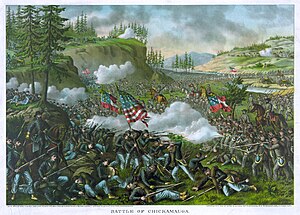The Battle of Chickamauga
| Battle of Chickamauga | |||||||
|---|---|---|---|---|---|---|---|
| Part of the American Civil War | |||||||
 Battle of Chickamauga (lithograph by Kurz and Allison, 1890) |
|||||||
|
|||||||
| Belligerents | |||||||
|
|
|
||||||
| Commanders and leaders | |||||||
| William Rosecrans | Braxton Bragg | ||||||
| Units involved | |||||||
| Army of the Cumberland | Army of Tennessee | ||||||
| Strength | |||||||
| ∼ 60,000 | ∼ 65,000 | ||||||
| Casualties and losses | |||||||
|
16,170 (1,657 killed
9,756 wounded 4,757 captured/missing) |
18,454 (2,312 killed
14,674 wounded 1,468 captured/missing) |
||||||
|
Chickamauga and Chattanooga National Military Park
|
|

Cannon row.
|
|
| Location | S of Chattanooga on U.S. 27, Fort Oglethorpe, Georgia |
|---|---|
| Built | 1890 |
| Architect | War Department; National Park Service |
| Architectural style | Other, Bungalow/craftsman, Single-pen log cabin |
| NRHP Reference # | 66000274 |
| Added to NRHP | October 15, 1966 |
The Battle of Chickamauga, fought on September 18–20, 1863 between Union and Confederate forces in the American Civil War, marked the end of a Union offensive in southeastern Tennessee and northwestern Georgia — the Chickamauga Campaign. It was the first major battle of the war fought in Georgia, the most significant Union defeat in the Western Theater, and involved the second-highest number of casualties after the Battle of Gettysburg.
The battle was fought between the Army of the Cumberland under Maj. Gen. William Rosecrans and the Confederate Army of Tennessee under Gen. Braxton Bragg, and was named for Chickamauga Creek, which meanders near the battle area in northwest Georgia (and ultimately flows into the Tennessee River about 3.5 miles (5.6 km) northeast of downtown Chattanooga).
After his successful Tullahoma Campaign, Rosecrans renewed the offensive, aiming to force the Confederates out of Chattanooga. In early September, Rosecrans consolidated his forces scattered in Tennessee and Georgia and forced Bragg's army out of Chattanooga, heading south. The Union troops followed it and brushed with it at Davis's Cross Roads. Bragg was determined to reoccupy Chattanooga and decided to meet a part of Rosecrans's army, defeat it, and then move back into the city. On September 17 he headed north, intending to attack the isolated XXI Corps. As Bragg marched north on September 18, his cavalry and infantry fought with Union cavalry and mounted infantry, which were armed with Spencer repeating rifles.
...
Wikipedia

